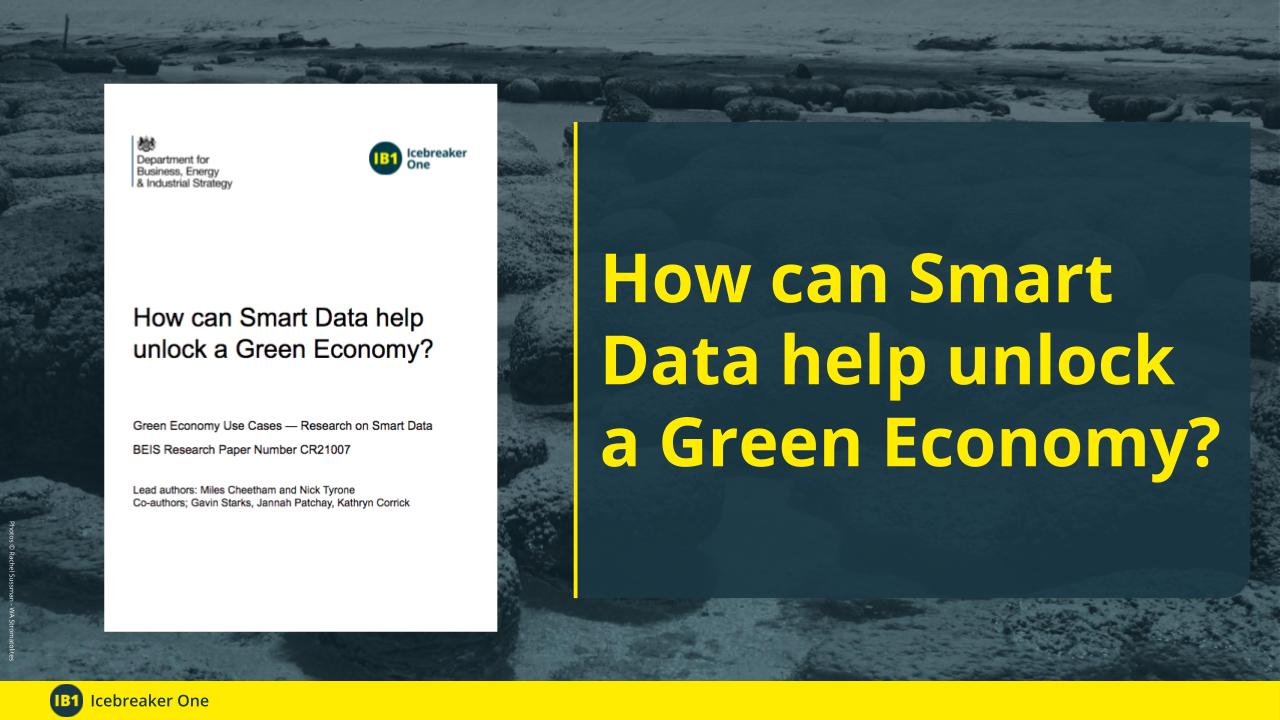How can Smart Data help unlock a Green Economy?
Green Economy Use Cases — Research on Smart Data
BEIS Research Paper Number CR21007
Lead authors: Miles Cheetham and Nick Tyrone
Co-authors; Gavin Starks, Jannah Patchay, Kathryn Corrick
Full report — open to comment by anyone: https://docs.google.com/document/d/1etehckR0wVJvAya7O2xJo7CYMMLJm1E_NvJeGki6hFg/edit
Executive Summary
This report focuses on use cases involving Smart Data that support the government’s environmental priorities and the Prime Minister’s ambitious ten-point plan for a green industrial revolution which will create and support up to 250,000 British jobs. The applications of Smart Data in the rollout of this plan are incredibly varied and cut across a wide range of sectors of the economy. It explores a representative cross-section of use cases, and seeks to prioritise where impact (environmental and economic) meets achievability (lower level of regulatory and technical complexity).
Smart Data becomes effective when it is connected
In terms of prioritisation of sector, use cases requiring cross-sector interoperability and cohesion offer the greatest immediate ability to create impact, with a manageable degree of complexity involved in rollout. These use cases support private sector growth and require achievable government intervention, allowing green growth and environmental goals to be met.
Cross-sector engagement is essential
Every sector has something to offer – and cross-sector engagement is necessary in order to make the ten-point plan come to life.
We recommend that the government provide the top-down policy and regulatory framework that maximises the potential for Smart Data to realise green growth. This is beginning to happen organically, albeit sector-by-sector. If well implemented, this would “uncork” data across sectors and result in accelerated growth for businesses and green economy initiatives.
In order to achieve this growth we must build on and broaden the scope of Smart Data to address:
- Creating the legal and regulatory framework that:
- Encourages organisations to share and consume data;
- Promotes investment in the the infrastructure required;
- Mandates key aspects such as types of essential data, taxonomies, standards and governance.
- Enhancing the national data infrastructure to support widespread cross-sector data sharing.
- Extending the scope of the Smart Data Initiative beyond finance, energy and telecoms to a broader set of sectors.
Data underpins every use case. Ensuring that as much data can be shared as possible is the key to unlocking the potential of Smart Data to create green growth. This is complicated in many sectors – for instance, in energy, where some data has to be closed for security reasons or in banking where personal data privacy and security is paramount – but maximum openness and strong governance must be achieved. Smart Data can, after all, only work with information that is readily available, discoverable and usable.
Data will be a powerful transformative resource as we transition to a green economy. We build upon prior work to explore how a market design for non-financial data sharing can enable access to, and usage of, Smart Data to help green the economy.
We propose considering:
- Mandating access to data
Ensure availability and secure access to machine-readable data as the foundation of Smart Data systems; - Mandating on cohesion and interoperability
Interoperability between sector specific initiatives with a common, trusted and consumer/business-friendly approach to core elements such as consent and authentication. - Unlocking innovation through multidisciplinary catalysts
Creation of a conducive, enabling environment which provides a balanced policy, legal and regulatory framework, alongside the National Data Infrastructure that allows data discovery and access with strong governance and privacy.
Opening up data in this way will provide the high quality information and insights that will enable informed decision making for the public and private sector alike. This is the enabler to support effective implementation of TCFD (Task Force on Climate-Related Financial Disclosures), a powerful framework for financial reporting in relation to climate change to support changing behaviour towards Net Zero targets. It will be essential that ‘green’ finance becomes the norm, and not (as at present) just about a suite of green products or financial instruments that can potentially be verified as such. Sustainability must be embedded and green principles extended into every corner of the financial markets infrastructure. The UK, through the City of London and the ambitions of the Leeds Infrastructure Bank, is strongly placed to influence financial behaviour not only domestically but globally.
‘Green’ must be a part of finance, not a category
For example, financial markets factor in market and credit risk already on a large scale. This is not the case yet for climate risk, which is increasingly seen as introducing the type of systemic risk that can precipitate a financial crisis. However, climate risk can be priced in to the same extent if data is available, accessible and standardised within a defined reporting regime. In practical terms this means moving beyond purely publishing data in annual reports or company websites, or non-machine readable formats, and ensuring that objective reporting (rather than subjective) is consistently applied. It means adoption of standardised, reliable, consistent machine-readable data, available via APIs and accessible through a well governed trust framework. This is entirely achievable, as it already exists in Open Banking and is developing rapidly under Open Energy.
This would revolutionise financial decision making and prove to be a major lever of change for transition to a fully green economy, while stimulating widespread economic growth in services consuming the data. Decision makers would understand their exposure to climate risk, and the consequences that arise from raised temperatures, more frequent extreme weather events and the associated systemic threats.
The government’s ten-point plan is ambitious: making our homes, schools and hospitals greener, warmer and more energy efficient, whilst creating 50,000 jobs by 2030, and a target to install 600,000 heat pumps every year by 2028. To develop the cutting-edge technologies needed to reach these new energy ambitions and make the City of London the global centre of green finance, Smart Data must be at the heart of the changes ahead.

